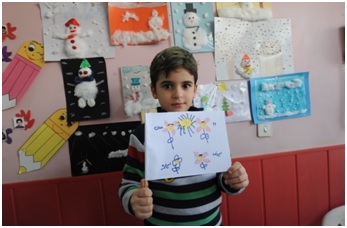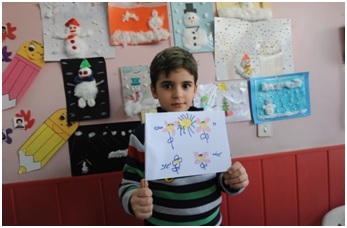 The youth is a particularly vulnerable group in Iran, where people under the age of 30 make more than sixty percent of the overall population[/caption]
The youth is a particularly vulnerable group in Iran, where people under the age of 30 make more than sixty percent of the overall population[/caption]TEHRAN, 9 November 2014 (UNIC)� Today, the United Nations Office on Drugs and Crime (UNODC) in the Islamic Republic of Iran in collaboration with the Drug Control Headquarters of the Islamic Republic of Iran, Ministry of Education and State Welfare Organization commenced implementation of Families and Schools Together (FAST) Programme.
This programme is being implemented at country level in the frame work of the UNODC Iran Country Programme in collaboration with the UNODC Regional Programme for Afghanistan and neighboring countries.
The FAST Programme aims to advocate a scientific and evidence-based drug prevention programmes, particularly for the families.

Mr. Leik Boonwaat, Representative of the UNODC Country Office in the Islamic Republic of Iran���Young people are at risk for substance abuse worldwide, as they are in a period of life subject to the influence of peers and role models who may be involved in the use of psychotropic substances� Mr. Leik Boonwaat, Representative of the UNODC Country Office in the Islamic Republic of Iran stated. The youth is a particularly vulnerable group in Iran, where people under the age of 30 make more than sixty percent of the overall population. Serious concerns have been expressed by both national authorities and the United Nations about a growing trend of amphetamine-type stimulants abuse in the country.
�Evidence-based drug prevention programmes are key components of medium/long-term successful drug control strategies� said Mr. Boonwaat. �Such programmes should be up-scaled as they work and are cost-effective: for every dollar spend, good programmes for prevention among youth can save up to ten dollars or even more if costs resulting from crime, unemployment and ill-health are counted� he added.
�Mr. Boonwaat commended drug prevention efforts led in the Islamic Republic of Iran by the Drug Control Headquarters over the last years.
UNODC activities in the field of drug demand reduction in the Islamic Republic of Iran have been conducted over the last four years thanks to the financial contribution of the Governments of Norway, Germany and Sweden. In close cooperation with the Drug Control Headquarters of the Islamic Republic of Iran, UNODC has developed and piloted expert guidelines and training packages for specific use in communities, educational and prison settings, targeting high risk groups.
UNODC Iran drug prevention projects address all forms of drug abuse (e.g. ATS, Cannabis and Opiates). The programme provides services to different walks of life: Families, Educational Settings, High risk groups, Prisons and the Workplace; with special emphasis on 'at risk' youth exposed to drugs. National experts were exposed to international best practices in the prevention through UNODC technical assistance and cooperation.
In his concluding remarks, Mr. Boonwaat called for more attention, resources and efforts in the field of drug prevention as necessary tools to effectively address the drug challenge. UNODC, with the necessary support of its international funding partners could assist national efforts in the provision of scientific and evidence-based information, as well as the promotion of skills and opportunities to make healthy choices.
By United Nations In Iran
The Iran Project is not responsible for the content of quoted articles.











